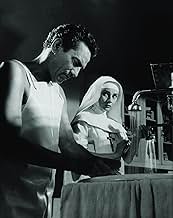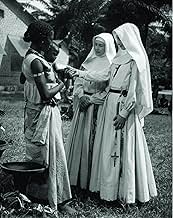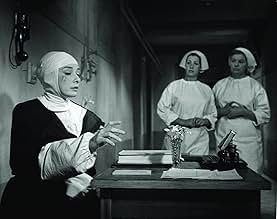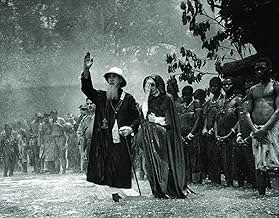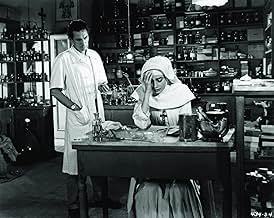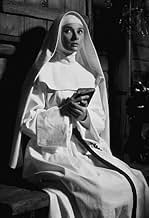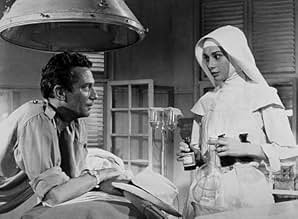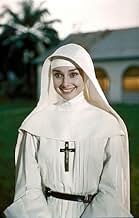Après avoir quitté une riche famille belge pour devenir religieuse, Soeur Luke lutte avec son dévouement à ses voeux pendant la crise, la déception et la Seconde Guerre mondiale.Après avoir quitté une riche famille belge pour devenir religieuse, Soeur Luke lutte avec son dévouement à ses voeux pendant la crise, la déception et la Seconde Guerre mondiale.Après avoir quitté une riche famille belge pour devenir religieuse, Soeur Luke lutte avec son dévouement à ses voeux pendant la crise, la déception et la Seconde Guerre mondiale.
- Nommé pour 8 Oscars
- 11 victoires et 23 nominations au total
- Rev. Mother Emmanuel (Belgium)
- (as Dame Edith Evans)
- Mother Mathilde (Africa)
- (as Dame Peggy Ashcroft)
Histoire
Le saviez-vous
- AnecdotesThis was one of Audrey Hepburn's favorite of her films. It was also one of her most financially successful.
- GaffesWhen the patient in the Congo hospital is being attended by several people, the voice of the actor playing the patient is obviously dubbed over by actor Dean Jagger, who plays Sister Luke's father in the film.
- Citations
Sister Luke: You can cheat your sisters, but you cannot cheat yourself or God.
Rev. Mother Emmanuel: Have you struggled long enough to say surely that you've come to the end?
Sister Luke: I think I've been struggling all these years, Reverend Mother. In the beginning each struggle seemed different from the one before it. But then they began to repeat, and I saw they all had the same core: obedience. Without question, without inner murmuring. Perfect obedience as Christ practiced it. As I no longer can.
Rev. Mother Emmanuel: Yes?
Sister Luke: There are times when my conscience asks which has priority. It or the Holy Rule? When the bell calls me to chapel, I often have to sacrifice what might be the decisive moment in a spiritual talk with a patient. I'm late every day for chapel or refectory or both. When I have night duty I break the Grand Silence because I can no longer cut short a talk with a patient who seems to need me. Mother, why must God's helpers be struck dumb by five bells in the very hours when men in trouble want to talk about their souls?
- ConnexionsFeatured in Dis-donc, papa: Testing Time (1990)
- Bandes originalesVoi Che Sapete
from "The Marriage of Figaro"
Written by Wolfgang Amadeus Mozart (as W. A. Mozart)
Played by Gabi and her father on the piano, and recurring throughout the film's score.
I knew I would enjoy at least Audrey Hepburn, and she's fabulous. But the movie came on as a Christmas Day feature and I worried that it would have too many religious overtones. Then as the credits rolled I saw it was directed by Fred Zinnemann. Zinnemann? I wondered what would draw him to this kind of story. My expectations tripled.
I was not disappointed. This is a measured but never slow movie. It's totally beautiful, it handles the sanctity of the convent with respect, never tipping into sappy adoration. Hepburn is what you want from her, lively and independent, and this is a natural conflict in a world of discipline and loss of independence. And it's also an evolving, changing story with a couple of major twists as it goes. By the end you see very much why Zinnemann wanted to do this and I can't tell you that. See for yourself.
The conflict between self and community, between having your own opinion about something and being forced to follow a larger set of rules that might not always be best, is the core of the film. When do you rebel? When do you submit? And if you have agreed beforehand to devote your life to submission, do circumstances allow an exception? A total change of heart?
If you think this sounds boring it is not. You might give Hepburn the biggest credit here--she's a natural and you are nothing but sympathetic--but the directing the cinematography are huge, as well. Behind the camera is Franz Planar, who did such trifles as "Holiday" and "Letter from an Unknown Woman" as well as two Audrey Hepburn movies "Roman Holiday" and "Breakfast at Tiffany's." If you have seen any of these (or all) you'll know how really perfectly they are filmed, with the camera in service to the story.
The story, by the say, in "The Nun's Story" is very much the point, even beyond the moral. When does a young woman leave a loving and comfortable home and join a convent, face a loss of self and freedom, and yet still feel useful to the world? Hepburn's character (who changes names, in part of the effort to leave the past behind), wants to go to Africa to serve the needy. How this is thwarted--or not--you'll see, but you really root for her. You see her brush against her principles in every way. And you see a larger principle arise--do the right thing. And she does. It's beautiful. It ought to make you cry. It will easily engage and move you.
- secondtake
- 25 déc. 2012
- Permalien
Meilleurs choix
Détails
- Date de sortie
- Pays d’origine
- Langue
- Aussi connu sous le nom de
- L'histoire d'une nonne
- Lieux de tournage
- Brugge, West-Vlaanderen, Belgique(Convent exteriors, other exteriors)
- Société de production
- Voir plus de crédits d'entreprise sur IMDbPro
Box-office
- Budget
- 3 500 000 $US (estimé)
- Durée2 heures 29 minutes
- Couleur
- Rapport de forme
- 1.85 : 1
Contribuer à cette page



